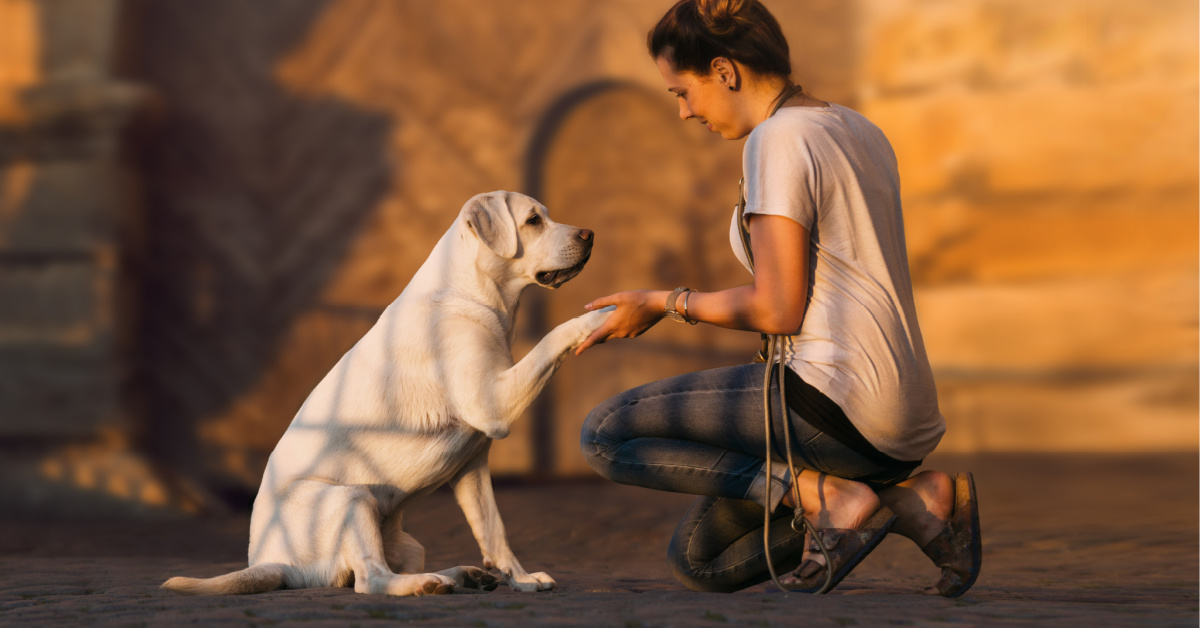There are a number of important Labrador training tips you have to keep in mind all the time if you have just brought home a Lab puppy for the first time.
As one of the many popular dog breeds in the world. Labrador Retrievers have many characteristics that make them so endearing.
They are kind, friendly, good with kids, good service dogs, and so much more.
But, no Labrador is born fully understanding those characteristics.
Since birth, they have their own personal temperaments that they may or may not carry throughout their lives.
However, despite their individual differences in temperament and behavior, there is one aspect of dog upbringing that completely makes or breaks a Labrador Retriever’s attitude towards many things—training.
Why is Labrador training important?
Training, such as Labrador obedience training, is probably the single most important thing that you can provide for your Lab.
Whether you’re training them or sending them to a Labrador training school, training allows your Lab to live great lives.
It is for this reason that important Labrador training tips come in handy.
There are different types of training that a Labrador Retriever will need to undergo. This will also depend entirely on where you are and what resources for training are available in your area.
Training encompasses a lot of things. It answers questions such as how to train a Labrador puppy to potty, how to train a Lab puppy not to bite, and can you train a one-year-old Lab to hunt, among others.
Either way, you have many options when it comes to training. So, you will surely find an advanced version of Labrador training near you that you may interested in.
Because training holds so much sway in your Lab’s way of life, it only makes sense that you invest time and effort in learning important Labrador training tips.
A little effort will make so much difference down the road, especially when you consider how long it takes to train a Labrador Retriever.
The rest of this article will explore three important Labrador training tips that you can apply in training your Lab.
1. Important Labrador training tips: Begin early
Possibly one of the best advantages you can get with training is starting early.
The traditional thinking was to wait until a puppy is six-months-old before any important Labrador training tip is given.
But lately, research has shown that it is actually not quite accurate.
The sooner you begin training your Labrador Retriever, the better. It is often suggested that a pet owner should start training their Lab puppy the moment it arrives home.
That would be at about 8 weeks old when the puppy is safe to bring home.
Even in the first few days, you should already start training your Labrador. For most Lab owners, the first part of training would be potty training or housebreaking.
This is the part where you have to condition your Labrador Retriever puppy to used to what it means to live in a home.
This means no pooping and peeing wherever they want without any regard for the area.
What to Expect them to Do
Hence, you have to train your Labrador to do what you expect them to do.
At its core, training is all about repetition and trying to get your Lab to understand what you want them to do and how they are supposed to behave. The younger they are, the easier it is to do.
When you start training at an older age, your Labrador will have had more time to learn bad habits.
However, if you start training early, there will be no room for them. Therefore, you would not need to break your Lab out of any unwanted habits.
Take note that starting training early may mean having to spend time at home with your puppy more than you expected.
In the first few days, you will have to watch them closely and observe them. It takes a degree of sacrifice to make it work, but all the good results will pay off.
2. Important Labrador training tips: Use positive reinforcement
Attention and care are both important things that will nurture your puppy and help make the Labrador training process more streamlined.
Punishment and scolding are a page out of a tradition’s book and deserve to be left behind in the past.
Previously, punishment and scolding were some of the most common approaches to training a pet. Today, however, that has changed quite a lot.
It is now established that punishing a dog is not nearly as effective as using positive reinforcement when training them.
When you punish your Lab for doing a bad thing. It will only teach them to fear you and to not do it when you are around.
The fear further adds a layer of complexity that may cause even more attitude and behavior problems in the future.
In fact, this study took a look at the various types of research that had been conducted on aversive training methods. Such as punishment.
It turns out that using aversive methods actually impacts the mental health and well-being of your dog.
The best way to approach training with your Labrador Retriever is to give them as much praise as you can when they do the right thing and to ignore their bad behavior outright so that they know that it will not get your attention.
It can be difficult to do that, and the compulsion to tell your puppy off for doing a bad thing may be strong.
But, it is easier for them to understand what you want them to do instead of telling them what not to do.
Given that, it is much easier to incentivize training periods by rewarding your Labrador with treats and praise.
Plus, there are other ways you can treat your Lab aside from food if you want to watch out for their health and weight.
You can also train your Labrador Retriever by making them understand that doing a certain action is what pleases you.
They will then try to emulate this behavior throughout the entirety of your training.
3. Important Labrador training tips: Be consistent
One important Labrador training tip you need to bear in mind is that training your Lab will be tough work since it will require a lot of patience. It may also take more time than you think.
Consequently, patience and consistency are key to training. With potty training your Lab, for example, you have to do your best to consistently apply the boundaries that you want to set in your home.
There will be some mistakes, and you may mess up along the way. But, you should try to be consistent as much as you can.
We have already established that training requires creating habits, which will not be learned in just a day.
You will need to exercise patience and consistency so that the training process will be easier and ultimately take less time.
Conclusion
Training your Lab may seem intimidating at first, especially when you have no experience with training dogs at all.
But, when you properly understand what it means to train a Lab, as well as the patience to go with it. You will be good to go.
Remember to be patient and kind in training your Labrador even when they mess up or do not do things right.
Training is also a learning process for them as much as it is for you. Eventually, you will be able to successfully train your Labrador.







